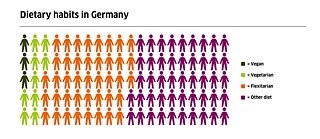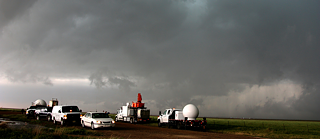More and more people in Germany are going vegetarian or even vegan. Why did this happen? And what are the benefits of a meat-free diet? An article by Robin Jüngling from nachhaltig.kritisch.
The debate about nutrition in Germany is often emotional. Tempers run high, especially when it comes to veganism. The question is no longer just what is on the plate, but also what impact the meal has on the environment, climate and animal welfare. But why is the topic so prevalent in Germany in particular?The development of vegan nutrition in Germany
Arguing about a meat-free diet has a long tradition here in Germany. Back in 2013, Veggie Day was an election campaign topic with which the Green party wanted to address and reduce the high meat consumption in Germany. A major tabloid newspaper ran the headline: ‘The Greens want to ban meat!’ and a big myth about veganism was born.Almost 10 years later, we are still having similar debates - although much has changed. In Germany, we have been eating less and less meat per capita for years. At the same time, vegetarian alternatives are booming, and ordering oat milk in a latte macchiato is no longer met with a sidelong glance.
More than one in ten people in Germany have completely cut out meat and fish from their diet. Three per cent of Germans are even vegan - meaning they do not eat animal products such as milk and eggs.

3 per cent of Germans follow a vegan diet and 9 per cent a vegetarian diet. A further 41 per cent describe themselves as flexitarian, i.e. they only eat meat occasionally. | Own illustration according to forsa
Livestock & greenhouse gases: why a vegan diet is good for the climate
In Germany, animal husbandry accounts for more than two-thirds of greenhouse gas emissions from agriculture. The global trend is similar: animal products account for more than half of global greenhouse gas emissions from food production. Plant-based foods contribute only 29 per cent. At the same time, only 37 per cent of the protein and 18 per cent of the calories we consume come from animal products.The biggest lever for addressing the climate crisis in the food sector is to avoid animal products. The 'trend' of veganism, which aims to address the current problem, has grown out of this need. This also explains why more and more people in Germany are going vegan.
An alternative to veganism: the Planetary Health Diet
How can we feed ourselves without wasting massive amounts of unnecessary emissions and resources? An international team of experts in health and sustainability - the EAT-Lancet Commission - has looked into this question. They came up with the Planetary Health Diet, a diet that could feed ten billion people in 2050 without causing lasting damage to the environment. The plan calls for doubling the consumption of pulses, nuts, fruit and vegetables, and halving the consumption of sugar and meat.The dietary guidelines of this Planetary Health Diet show: No one in this country has to sacrifice taste or enjoyment. But we do need to rethink the way we eat. The average of six schnitzels a week eaten in Germany is too much from a climate and resource point of view - even if no one wants to ban the beloved schnitzel per se.
Conclusion:
The 'vegan trend' in Germany can be an important impetus for a more sustainable diet, even if it is not enough on its own to tackle the climate crisis. Both individual changes and structural adjustments are needed to minimise the negative impacts of animal agriculture on the environment and climate. The growing number of vegans in Germany shows that more and more people are willing to rethink their eating habits.December 2024




